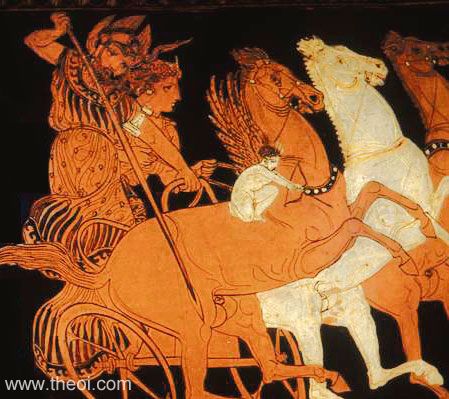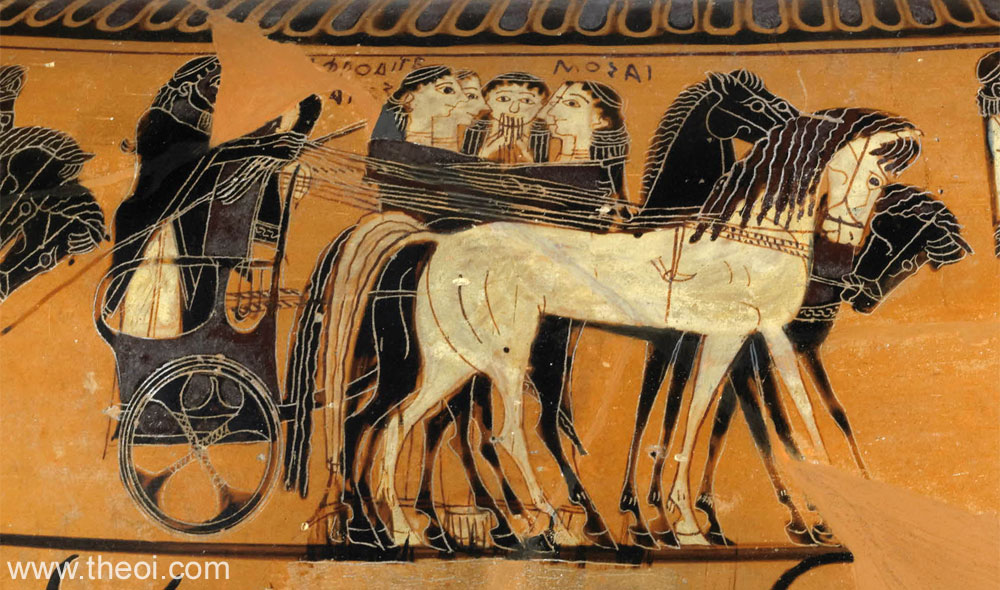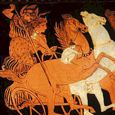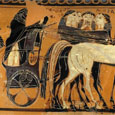HORSES OF ARES (Hippoi Areioi) (original) (raw)
Greek Mythology >> Bestiary >> Immortal Horses >> Horses of Ares (Hippoi Areioi)
Transliteration
Hippoi Areioi
Translation
Horses of Ares
Horses and chariot of Ares, Athenian red-figure amphora C4th B.C., Musée du Louvre
THE HIPPOI AREIOI (Horses of Ares) were four immortal horses named Aithon (Aethon), Phlogios (Phlogius), Konabos (Conabus) and Phobos (Phobus) which drew the chariot of the god Ares.
FAMILY OF THE HORSES
PARENTS
BOREAS & AN ERINYS (Quintus Smyrnaeus 8.239)
NAMES
AITHON, PHLOGIOS, KONABOS, PHOBOS (Quintus Smyrnaeus 8.239)
CLASSICAL LITERATURE QUOTES
Homer, Iliad 5. 352 ff (trans. Lattimore) (Greek epic C8th B.C.) :
"[Aphrodite is wounded by Diomedes in the Trojan War :] Dropping on one knee before her beloved brother [Ares] in deep supplication she asked for his gold-bridled horses : ‘Beloved brother, rescue me and give me your horses so I may come to Olympos (Olympus) where is the place of the immortals . . .’
So she spoke, and Ares gave her the gold-bridled horses, and, still grieved in the inward heart, she mounted the chariot and beside her entering Iris gathered the reins up and whipped them into a run, and they winged their way unreluctant. Now as they came to sheer Olympos, the place of the immortals, there swift Iris the wind-footed reined in her horses and slipped them from the yoke and threw fodder immortal before them."
Homer, Iliad 15. 110 ff :
"[Ares] ordered Phobos (Fear) and Deimos (Terror) to harness his horses, and himself got into his shining armour."
Hesiod, The Shield of Heracles 56 ff (trans. Evelyn-White) (Greek epic C8th or 7th B.C.) :
"Ares insatiable in battle, blazing like the light of burning fire in his armour and standing in his chariot, and his running horses trampled and dented the ground with their hooves, and the dust swirled up around them, beaten up between the compacted chariot and the feet of the horses, and the well-put-together chariots and their rails clattered to the gallop of the straining horses."
Hesiod, The Shield of Heracles 191 ff :
"[Depicted on the shield of Herakles (Heracles) :] And on the shield stood the fleet-footed horses of grim Ares . . . he was red with blood as if he were slaying living men, and he stood in his chariot. Beside him stood Deimos (Fear) and Phobos (Flight), eager to plunge amidst the fighting men."
Hesiod, The Shield of Heracles 460 ff :
"[Ares retreats to Olympos after being wounded by Herakles :] Phobos (Panic) and Deimos (Terror) drove their smooth-running chariot and horses close up to him, and lifted him from the wide-wayed earth and set him in the elaborate chariot and presently lashed on the horses, and they made their way to tall Olympos."
Homeric Hymn 8 to Ares (trans. Evelyn-White) (Greek epic C7th or 6th B.C.) :
"Ares, exceeding in strength, chariot-rider . . . who whirl your fiery sphere [i.e. the star Mars] among the planets in their sevenfold courses through the aither wherein your blazing steeds ever bear you above the third firmament of heaven."
Quintus Smyrnaeus, Fall of Troy 8. 239 ff (trans. Way) (Greek epic C4th A.D.) :
"Murderous Ares came [to the battlefields of Troy], unmarked of other Gods, down from the heavens, eager to help the warrior sons of Troy. Aithon (Aethon, Red-fire) and Phlogeus (Flame), Konabos (Conabus, Tumult) and Phobos (Panic-fear), his car-steeds, bare him down into the fight, the coursers which to roaring Boreas grim-eyed Erinnys (Fury) bare, coursers that breathed life-blasting flame: groaned all the shivering air, as battleward they sped. Swiftly he came to Troy: loud rang the earth beneath the feet of that wild team."
Ovid, Metamorphoses 14. 820 ff (trans. Melville) (Roman epic C1st B.C. to C1st A.D.) :
"Gradivus [Mars-Ares] . . . leaning upon his spear he leapt into his bloodstained chariot and cracked his whip and lashed his team and, plunging through the sky, stood on the sylvan peak of Palatium [in Rome]."
Virgil, Georgics 3. 89 ff (trans. Fairclough) (Roman bucolic C1st B.C.) :
"[The finest steeds :] Such was Cyllarus, tamed by the reins of Amyclaean Pollux [Polydeukes], and those whose fame Greek poets recount, the two steeds of Mars [Ares], and the pair of the great Achilles."
Valerius Flaccus, Argonautica 3. 89 ff (trans. Mozley) (Roman epic C1st A.D.) :
"Fear and Dread (Iovis Terrorque Pavorque), the horses of Mars [Ares]."
Statius, Thebaid 7. 64 ff (trans. Mozley) (Roman epic C1st A.D.) :
"Earth trembles, and horned [river] Hebrus bellows and stays his torrent's flow; then all the war-steeds that troubled the valley sped foaming o'er the frightened meads, sure sign of his [Ares] approach . . . Glorious in Hyrcanian gore he himself [Mars-Ares] comes riding by . . . with bloody hand dark Bellona [Enyo] guides the team and plies them hard with her long spear."
Statius, Silvae 1. 1. 18 (trans. Mozley) (Roman poetry C1st A.D.) :
"Loftily does the Bistonian [Thracian] steed bear Mars [Ares] when the fighting is done, exulting in the mighty weight, and swiftly flies by the river till he is all asteam and with his strong blowing stirs up the waves of Strymon [a Thracian River]."
Nonnus, Dionysiaca 29. 364 ff (trans. Rouse) (Greek epic C5th A.D.) :
"In hot haste he [Ares] leapt up, and awoke Phobos (Rout) and Deimos (Terror) to yoke his deadly quickrunning car. They obeyed their urgent father. Furious Deimos set the crooktooth bit in the horses' mouths, and fastened their obedient necks under the yokestrap, and fitted the neckloop on each : Ares mounted the car, and Phobos took the reins and drove his father's chariot."
Horses and chariot of Ares, Athenian black-figure dinos C6th B.C., British Museum
NAMES OF THE HORSES
Greek Name
Αιθων
Κοναβος
Φοβος
Φλογευς
Transliteration
Aithôn
Konabos
Phobos
Phlogeus
Latin Spelling
Aethon
Conabus
Phobus
Phlogeus
Translation
Fiery, Burning (aithôn)
Clashing Din (konabos)
Panic Flight (phobos)
Flaming, Fire-Bright (phlogeus)
ANCIENT GREEK ART
K9.1 Chariot & Horses of Ares
Athenian Red Figure Vase Painting C5th B.C.
K20.11A Chariot & Horses of Ares
Athenian Black Figure Vase Painting C6th B.C.
SOURCES
GREEK
- Homer, The Iliad - Greek Epic C8th B.C.
- Hesiod, The Shield of Heracles - Greek Epic C8th - 7th B.C.
- The Homeric Hymns - Greek Epic C8th - 4th B.C.
- Quintus Smyrnaeus, Fall of Troy - Greek Epic C4th A.D.
- Nonnus, Dionysiaca - Greek Epic C5th A.D.
ROMAN
- Ovid, Metamorphoses - Latin Epic C1st B.C. - C1st A.D.
- Virgil, Georgics - Latin Bucolic C1st B.C.
- Valerius Flaccus, The Argonautica - Latin Epic C1st A.D.
- Statius, Thebaid - Latin Epic C1st A.D.
- Statius, Silvae - Latin Poetry C1st A.D.
BIBLIOGRAPHY
A complete bibliography of the translations quoted on this page.



